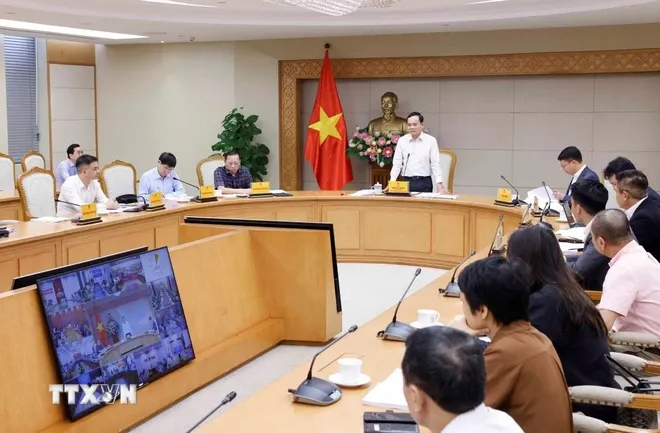[CORPORATE PARTNER] BASF launches game-changing heat and light stabilizer Tinuvin® NOR® 211 AR for sustainable farming practices
Read more

On Wednesday, May 8, 2024, the Prime Minister’s Taskforce on Administrative Procedure Reform (APR), led by Deputy Prime Minister Tran Luu Quang, met to discuss enhancing administrative efficiency. Representatives from the Ministries of Defense (MOD), Foreign Affairs (MOFA), and Information and Communication (MIC) were present alongside delegates from Hanoi, Ho Chi Minh City, Can Tho, Da Nang, Hai Phong, Quang Ninh, Hai Duong, and Tay Ninh.
Members of the Advisory Council for Administrative Procedure Reform (ACAPR), including EuroCham, Vietnam Software & IT Services (VINASA), Japan Chamber of Commerce and Industry (JCCI), Vietnam Textile and Apparel Association (VITAS), and Vietnam Young Entrepreneur Association (VYEA), shared their insights.

EuroCham’s Vice-Chair Minh Nguyen, who also serves on ACAPR’s Committee 1 for Policy and Procedure Reform, actively advocated for EuroCham Vietnam members’ concerns while highlighting practical solutions during the discussions.
At the meeting, he discussed the challenges businesses face when navigating administrative procedures. These range from major issues lacking clear policy frameworks, such as renewable energy, to cross-sector concerns like licensing, work permits, taxes, and customs. Specifically, he addressed cybersecurity and new telecommunications regulations with the MIC, and the expansion of visa exemptions to all EU Member States, as well as EU-Vietnam diplomatic relations, with the MOFA.
Deputy Prime Minister Tran Luu Quang underscored the need for ministries, agencies, and localities to consistently review and reduce internal procedures to improve efficiency and eliminate administrative barriers. He emphasised that ministries like MIC, MOD, and MOFA lagged behind provinces in maintaining synchronised dossiers on the Public Service Portal. This synchronisation involves ensuring that administrative documents are regularly updated, consistent, and accessible across government bodies through the centralised Public Service Portal. Such a unified documentation system is crucial for streamlined governance and efficient service delivery.
Many localities also underperformed in providing comprehensive online public services, with Hai Duong as a notable exception, achieving a 71% online payment rate. The MOD, MOFA, and Quang Ninh were praised for their 100% success rate in addressing feedback from individuals and organisations. However, other entities faced implementation obstacles like inadequate infrastructure, delays in publishing and digitising administrative procedures, restructuring issues, and low data reuse rates, leading to poor dossier synchronisation on the Public Service Portal.
Proposals to address these challenges included linking ministries’ databases, enhancing the Public Service Portal’s payment feature, improving land management software, creating new mechanisms for IT investment, and accelerating digital signature issuance.
The Ministries of Defense, Foreign Affairs, and Information and Communication were directed to proceed with administrative reforms as planned. MIC was tasked with streamlining business licences, while MOD was to finalise military service procedures. Key localities, including Hanoi, Ho Chi Minh City, Quang Ninh, and Binh Duong, were directed to implement one-stop shop services in 2024, setting a blueprint for streamlined administrative processes nationwide.
See all
